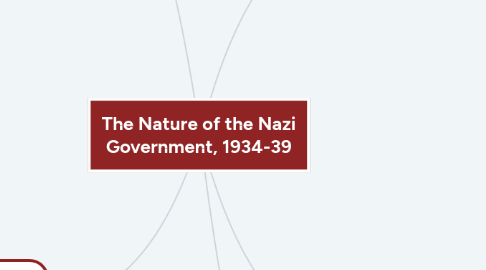
1. Polycratic regime
1.1. Disorganisation and chaos
1.1.1. Otto Dietrich: "In the twelve years of his rule in Germany, Hitler produced the biggest confusion in government that has ever existed in a civilised state."
1.2. 1936- The government had created a myriad of organisations = polycratic
1.2.1. Ministries
1.2.1.1. Ministry of Economics
1.2.1.2. Ministry of Labour
1.2.1.3. Ministry of the Armed Forces
1.2.1.4. Ministry of Foreign Affairs
1.2.1.5. Ministry of Aviation
1.2.1.6. Ministry of Public Enlightenment and Propoganda
1.2.2. Nazi party departments
1.2.2.1. Developed policy on different areas of national life e.g department of labour
1.2.3. Supreme Reich authorities
1.2.3.1. Special agencies created by Hitler
1.2.3.2. Not part of the state nor the party
1.2.3.3. Four Year Plan Organisation
1.2.3.3.1. Tasked with creating new economic policy
1.2.3.3.2. Power to organise labour, industrial production, arms production, agriculture and transport
1.2.3.4. the Todt Organisation (OT)
1.2.3.4.1. Power to organise labour, produce armaments and build roads
1.2.3.4.2. Built almost 1,000km of Autobahn between 1935-36
1.2.3.5. German Labour Front (DAF)
1.2.4. The relationship between the different organisations were never clarified
1.2.4.1. The Ministry of Economics was trying to trade with nations in South America nut the Four Year Plan Organisation was trying to build an autarkic economy
1.2.4.2. Disputes within senior officials would have to be resolved by Hitler
2. Prerogative state
2.1. Power came from Hitler's right to rule
2.1.1. No clear rules = chaotic government
2.1.2. Hitler's power = limitless
2.2. Hitler's Laws
2.2.1. Hitler would pass laws to keep up the pretence that his actions were legal
2.2.1.1. Night of the Long Knives and the subsequent Law Regarding Measures of State Self-Defence
3. Personal rivalries
3.1. Himmler and Goering
3.1.1. Fought over control of Germany's political police
3.1.2. 1933- Himmler set up the SD, Goering set up the Gestapo
3.1.3. Mid 1934- Himmler and Heydrich worked to make the Gestapo free from Goering
3.1.4. 1935- Himmler won a legal battle against Goering, who ignored it because courts had little authority
3.1.5. 1946- Goering was forced to relinquish control
3.2. The Night of the Long Knives
4. Cumulative radicalisation & "working towards the Fuhrer"
4.1. Cumulative radicalisation
4.1.1. Hitler's undisputed authority led to government officials pandering to him
4.1.1.1. Harsher Anti-Jew Policies
4.1.1.1.1. 1937- Goering's policy of Aryanisation
4.1.1.1.2. 1938- Heydrich's SD began forced emigration
4.1.1.1.3. 1938- Kristillnacht
4.1.1.1.4. Late 1938- Complete Aryanisation
4.1.2. Chaotic Government
4.1.2.1. Nazi Racial Policy
4.1.2.1.1. Goering's policy of stripping Jews of their wealth conflicted with the SD's policy of emigration
4.1.3. Intensification of Nazi policies
4.2. Working towards the Fuhrer
4.2.1. Hitler = only true basis for Nazi policies
5. Hitler's Role
5.1. Hitler's Personality
5.1.1. Not involved in economic policy
5.1.1.1. 1933-36 Left to Schacht
5.1.1.2. War years- Goering
5.1.2. Involved in foreign policy
5.1.2.1. 1936- Authorised remilitarisation of the Rhineland
5.1.2.2. 1938- Ordered Anschluss with Austria
5.1.2.3. 1939- Declaration of war on Poland
5.1.3. Style of leadership = cult of personality
5.2. Rejections of Formality
5.2.1. Disliked formal government meetings
5.2.1.1. The German Cabinet met less and less frequently
5.2.1.1.1. 1933- once or twice a week
5.2.1.1.2. 1934- 19 meetings
5.2.1.1.3. 1935- 12
5.2.1.1.4. 1936- 4
5.2.1.1.5. 1938- meetings ceased
5.2.1.2. Refused to chair any government committees
5.3. The purpose of chaos
5.3.1. Polycratic government = allowed Hitler to divide and rule
5.3.2. Heightened Hitler's authority
5.3.3. Faction fighting = stronger government, much like Social Darwinism
5.4. Non-interventionist dictator
5.4.1. Preferred to delegate issues to subordinates
5.4.2. "Hitler did little to resolve the problem for many months, but when a crisis struck he intervened decisively,"
